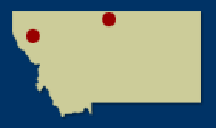
Three Notre Dame faculty members and eight undergraduates are the charter members of an upcoming new environmental science summer experience in Montana that has the unusual additional missions of reuniting Native Americans with their ancient lands and enhancing Native American educational opportunities at the University.
The new program on the reservation of the Confederate Salish and Kootenai Indian tribes (CSKT) in central Montana is dubbed UNDERC-West and designed to mirror the summer experience of its namesake, the Hank University of Notre Dame Environmental Research Center (UNDERC) in northern Michigan, now called UNDERC-East.
UNDERC director Gary Belovsky, an ecologist; assistant director James English, a population biologist; and anthropologist Joanne Mack, as well as an ecologist from Montana State University, will teach modules on grasslands, mountains, wildlife and Native American ecology.
The eight undergraduates include three Native Americans, one who transferred to Notre Dame this academic year after experiencing the UNDERC-East program last summer. It is funded by a National Science Foundation undergraduate mentoring grant. The nine-week program has been specifically designed to provide students with a cultural learning experience as they undertake their scientific and research goals.
This years program will take place on land west of the Rocky Mountains that is administered by the CSKT. The tribes will provide students access to grasslands rich in animal life, streams, wetlands and elevated forest habitats. The highest elevations support alpine tundra and host glaciers, says Belovsky, who has conducted research in the area for almost 30 years.
This opens a whole ecological realm that our students have not been able to study,he says.
The longer-term goal is for Notre Dame and CSKT to continue this education and research partnership to include acreage east of the Rockies that the tribes will be purchasing. This additional land, a privately owned farm and ranch, would regain some of the tribesancestral lands and make available a greater diversity of habitats for the students. The Trust for Public Lands, a nonprofit land conservation organization, is working with the tribes and Notre Dame to help raise money for the purchase of the land and to provide endowment funding for education and research.
Belovsky had been working to launch UNDERC-West for more than four years when word of the lands availabilityand its potential for building Notre Dame-Native American relationsbecame clear. John Affleck-Graves, executive vice president, and Jeffrey Kantor, vice president for graduate students and research, have both been instrumental in nudging the burgeoning relationship to reality.
This partnership has been a wonderful investment of our time and energy because it allows an enhanced undergraduate research opportunity in the context of a unique cultural exchange,Affleck-Graves says.The program provides an important opportunity for richer research and deeper community experiences for both our students and those in the CSKT and other Native American societies.
The traditional UNDERC undergraduate program has exposed students to the challenge of living and doing research in a natural and wild environment. With UNDERC-West, the program, carries the additional advantage of a cross-cultural learning experience. Students will gain understanding of Native American cultures both by working with Native American students and working on a reservation.
To me, its a natural pairingan anthropological perspective which involves knowing what the past cultural perspective of the land was, and how it was used, as well as the current Kootenai-Salish perspective,Mack says.
A similar program is being prepared in Puerto Rico (it will be called UNDERC-South) in conjunction with the University of Puerto Rico. UNDERC-Souths first summer program is expected to launch in 2007 for Notre Dame students, but University of Puerto Rico students will participate in UNDERC-East this coming summer.
Although administered by biologists, UNDERC experiences draw students ranging from anthropology to engineering majors whose interests include environmental law, education and policy. and biology. More than 25 percent of UNDERC alums are in graduate school today, Belovsky says.
p.
TopicID: 17284